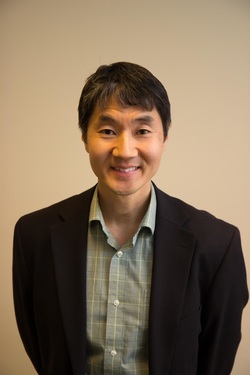For Emory Professor of Biochemistry Ichiro Matsumura, PhD, inspiration to pursue a career in research came from an unlikely source: a concussion. When Matsumura was in college at MIT, he got into a bike accident that left him hospitalized for several months. After being released from the hospital, Matsumura was prepared to retake all his courses from that semester over the summer. However, one of Matsumura’s professors, Harry Lodish, gave him the option to write a report from a list of topics instead of retaking the course, given that he had done well on the class’s first midterm. The topic Matsumura chose was evolution, which he would later dedicate his career to studying.
“That [summer] was what got me excited about evolution,” Matsumura said. “Eventually when I went to grad school a couple years later, I already knew I already who the leaders of the field were, and so I just applied to those specific departments.”

Ichiro Matsumura, PhD
Matsumura credits that summer project with helping him identify key research questions. Given the field of molecular evolution was young at the time, Matsumura was able to read every issue of Molecular Biology and Evolution and learn the names of all the contributors in the field. Later as a grad student, Matsumura learned how to formulate hypotheses and design informative experiments. He would use these skills to apply for a competitive NSF postdoc fellowship, and to develop an independent research program within the lab of his advisor, Andy Ellington.
Today, Matsumura leads a lab at Emory that studies evolution on a molecular level. His work has yielded discoveries of proteins with pharmaceutical and industrial uses, as well as illuminated the evolutionary process within cells and microorganisms. Recently, Matsumura has explored what factors account for variation in how bacteria grows. When examining bacterial cultures with the same initial genotype, Matsumura found that the cultures develop variations, even if grown in similar environments. Eventually, he began to realize that these variations could not simply be accounted for by different copy numbers or multicopy plasmids. Instead, he was witnessing evolution taking place on a molecular level.
“If you think about how much a bacterium can replicate itself over say 30 Generations, it’s a lot of opportunity for mutation,” Matsumura said. And so especially with multicopy plasmids, you have so many copies per cell, so many generations, and so many cells per milliliter, it just sort of becomes inevitable that some of them start getting mutated.”
Matsumura’s work has implications for a wide range of topics, including novel gene therapy technologies. Gene therapy relies on the interstation of a “stressor DNA” into a cell as the impetus for genetic change that improves the health of the cell. Based on Matsumura’s findings regarding molecular evolution however, such changes on a genetic level can lead to unintended mutations. Matsumura is working on techniques that could prevent damaging consequences as a result of this process, by forcing the cell to express specific proteins. While he is currently exploring the technique using bacteria, it could potentially be used on human cells as well.
Balancing the need to protect intellectual property while publishing work has sometimes proved challenging for Matsumura, as he believes it can be for many scientists. While publishing work in a timely manner is essential for obtaining research grants, doing so can be considered a “public disclosure,” starting the clock on a limited amount of time to obtain a patent. To help augment his knowledge of the patent process, Matsumura took a class on intellectual property at Emory Law School, offered as part of a program where Emory faculty can take courses for free. There he worked with his professor to discuss which projects he was currently working on could be suitable for patenting.
“It, to some extent, falls upon the shoulders of us investigators to make a case and to prove that [an innovation] could of be value and therefore worth patenting,” Matsumura said. “And that’s not always an easy case to make.”
Given his long and successful career, Matsumura has two key pieces of advice for those seeking to follow his path. The first essential piece is worrying more about establishing strong working relationships than raw talent. Matsumura believes that he overestimated the role of measures such as test scores in predicting future success.
“You need a certain threshold of talent to get into grad school and to get that first job, but once you’re along a certain way, it really ends up becoming more a matter of personality that determines who succeeds and who doesn’t,” Matsumura said. “I did spend a fair amount of time when I was younger, thinking about what I’m good at and how good I am at those things, and I think I may have spent a little bit too much time thinking about that.”
The second key piece of advice that Matsumura would give is not being afraid of failure and learning from mistakes. He emphasizes willingness to learn the “right lessons,” as opposed to just the easy lessons from mistakes, as an important part of this process. Ultimately, learning from mistakes has been defining for Matsumura’s career path, even as he recognizes that he was privileged to receive the benefit of the doubt and the ability to learn from these mistakes.
“It’s really hard I think to go through life and to get everything right the first time, and so for me learning how to solve problems and make good decisions all requires doing things wrong, figuring out that I did them wrong, and trying to do better the next time,” Matsumura said. “Since I had to figure it out learning the hard way, at the very least, I think that I taught my younger self that that’s okay.”
Ichiro Matsumura: https://ichirobot.weebly.com/